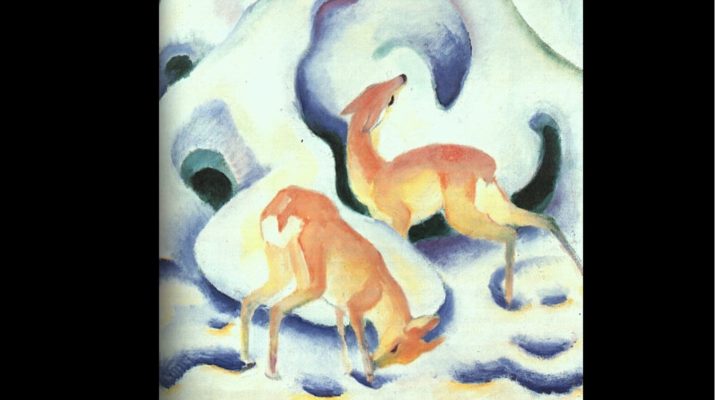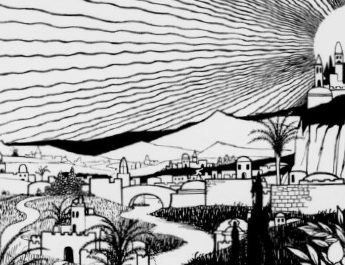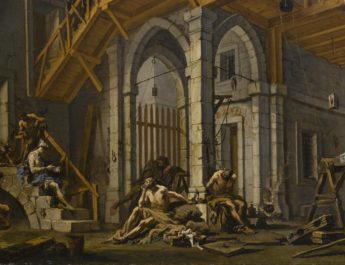Psalm 42
Easter Vigil A
To the leader.A A MaskilB of the Korahites.C
A “leader” = natsach. Properly, something that glitters from a distance. So, something that stands out, excels, has status/standing (such as a chief musician or superintendent of Temple services). This can also mean to be permanent or enduring.
B “Maskil” = maskiyl. 13x in OT. From sakal (to consider or be prudent; to instruct, be an expert; dealing prudently, which implies success and prospering; can mean laying cross-wise). This is maskil or maschil. It is a poem used for instruction.
C “Korahites” = ben + Qorah. Literally “sons of Korah.” Ben is son, age, child. It is son in a literal or figurative sense. Qorah is from qarach (to shave bald, perhaps frozen). This is Korah, perhaps meaning “bald” or “ice.”
1 As a deerD longsE for flowingF streams,G
so my soulH longs for you, O God.I
D “deer” = ayyal. 11x in OT. From the same as ulam (porch, hall); from the same as ul (mighty, strength, body, belly; root may mean to twist and that implies strength and power); from alam (to bind or tie fast; to be silent or speechless, whether voluntary or involuntary) or from ayil (strength; things that are strong or powerful: political chiefs, rams, posts, trees, oaks). This is deer, hart. It can symbolize leaping, looking for pasture or sustenance. It can also be used to refer to princes.
E “longs” = arag. 3x in OT – 2x in Psalm 42 & 1x in Joel 1 of wild animals crying out to God when their water sources dry up. This is panting, longing, or crying.
F “flowing” = aphiq. 19x in OT. From aphaq (to be strong, force, control, hold). This is a channel, brook, stream, tube, river. It is something that contains so it is a tube or valley where a stream is. It can also be something strong or a hero.
G “streams” = mayim. This is water, waters, or waterway in a general sense. Figuratively, it can also mean juice, urine, or semen.
H “soul” = nephesh. Related to naphash (to refresh or be refreshed). This is soul, self, person, emotion. It is a breathing creature. Can also refer to appetites and desires.
I “God” = Elohim.
2 My soul thirstsJ for God,
for the livingK God.L
J “thirsts” = tsame. 10x in OT. This is to thirst in a literal or figurative sense.
K “living” = chay. From chayah (to live or keep alive literally or figuratively). This is alive, living, lifetime. It can also be used to describe someone’s age. It can refer to animals, plants, water, or a company or congregation of people. It is life in a very broad sense.
L “God” = El. Related to “God” in v2. See note I above.
When shall I come and beholdM
the faceN of God?O
M “behold” = raah. This is to see in a literal or figurative sense so stare, advise, think, view.
N “face” = paneh. From panah (to turn, face, appear). This is face in a literal or figurative sense. It could be face, presence, anger, respect. It can also be used of God to indicate divine favor or presence.
O “God” = Elohim. Same as “God” in v2. See note I above.
3 My tearsP have been my foodQ
day and night,R
while people say to me continually,S
“Where is your God?”T
P “tears” = dimah. From dema (juice, liquor); from dama (to weep). This is tears from weeping.
Q “food” = lechem. From lacham (to eat, feed on). This is bread, food, loaf. It can refer to food more generally for people or for animals.
R “night” = layil. Properly, this refers to light twisting away. It is used for night or midnight. Figuratively, this can mean adversity.
S “continually” = kol + yom. Literally “all day.”
T “God” = Elohim. Same as “God” in v2. See note I above.
4 These things I remember,U
as I pourV out my soul:
how I wentW with the throng,X
U “remember” = zakar. This is to remember, to mark something so that it can be recalled, to be mindful of, to mention.
V “pour” = shaphak. This is to pour out, gust, or slip. It can be to pour as blood, a drink offering, or molten metal. It can also mean to create a mound. Figuratively, it can refer to killing, or spending money.
W “went” = abar. This is to pass over or cross over. It is used for transitions, whether literal or figurative. It can also mean to escape, alienate, or fail. This is the root verb from which “Hebrew” is drawn.
X “throng” = sak. 1x in OT. From sakak (to weave or knit together). This is a throng, crowd, or multitude.
and led them in processionY to the houseZ of God,AA
Y “led…in procession” = dadah. 2x in OT. This is to wander, walk softly, move slowly. So, it could also refer to one who leads a procession.
Z “house” = bayit. Probably from banah (to build, make, set up, obtain children; to build literally or figuratively). This is house, court, family, palace, temple.
AA “God” = Elohim. Same as “God” in v2. See note I above.
with gladBB shoutsCC and songs of thanksgiving,DD
a multitudeEE keeping festival.FF
BB “glad” = rinnah. From ranan (a cry of joy or a joyful song; properly, emitting a shrill sound, especially one of joy). This is a song, shout, cry of joy, or proclamation. It could also be a shout of grief.
CC “shouts” = qol. This is a sound, used often for human voices. Also used when God speaks or angels, animals or instruments. It can be a cry or a noise, thunder or earthquakes and so on.
DD “songs of thanksgiving” = todah. From yadah (to throw one’s hands into the air in a gesture of praise, to give thanks, or make a confession); from yad (hand, ability, power; hand in a literal sense; what one can do or the means by which one does it). This is properly extending one’s hand, which implies affirmation and adoration. It can be a song of thanksgiving, a choir of thanksgiving, confession, or praise. It can also be a thank offering.
EE “multitude” = hamon. From hamah (to growl, cry out, be moved, murmur, hum, mourn, rage, clamor). This is a sound, noise, roar, rumbling, wealth, crowd, disquietude.
FF “keeping festival” = chagag. 16x in OT. This is feast, celebrating a festival, making a pilgrimage. Properly, it means going in a circle or marching in sacred procession. It implies giddiness and dancing. It can also mean reeling to and fro.
5 Why are you cast down,GG O my soul,
and why are you disquietedHH within me?
HopeII in God;JJ
GG “cast down” = shachach. This is to sink, bow down, bring low, be humbled, sing softly.
HH “disquieted” = hamah. Related to “multitude” in v4. See note EE above.
II “hope” = yachal. This is to wait, which implies patience, hope, and trust. It can also be pained waiting.
JJ “God” = Elohim. Same as “God” in v2. See note I above.
for I shall again praiseKK him,LL
my helpMM 6 and my God.NN
KK “praise” = yadah. Related to “songs of thanksgiving” in v4. See note DD above.
LL “him” = paneh. Same as “face” in v2. See note N above.
MM “help” = yeshuah. From yasha (to deliver, defend, help, preserve, rescue, be safe. Properly, to be open, wide or free, which implies being safe. Used causatively, it means to free). This is salvation, deliverance, health, victory, prosperity.
NN “God” = Elohim. Same as “God” in v2. See note I above.
My soul is cast down within me;
therefore I remember you
from the landOO of JordanPP and of Hermon,QQ
from Mount Mizar.RR
OO “land” = erets. Root may mean to be firm. This is earth, ground, field land, or country.
PP “Jordan” = yarden. From yarad (to go down, descend; going down in a literal or figurative sense; going to the shore or a boundary, bringing down an enemy). This is the Jordan River, meaning “descending.”
QQ “Hermon” = Chermonim. 1x in OT. From Chermon (Hermon, meaning “sacred mountain” or “abrupt”); from charam (to devote or onsecrate; it cou be a ban – devoted for a religious purpose and to be destroyed as part of worship; so also cursed, destruction, forfeit; also, having a flat nose). This is Hermons or Hermonites.
RR “Mizar” = Mitsar. 1x in OT. From tsasr (to be brought low, small, little one; figuratively, be insignificant or ignoble) OR from the same as mits’ar (something small, insignificant, petty, short time); from tsaar (see above). This is Mizar, a mountain.
7 DeepSS callsTT to deep
at the thunderUU of your cataracts;VV
all your wavesWW and your billowsXX
have gone over me.
SS “deep” = tehom. Perhaps from hum (to roar, murmur, cause an uproar, agitate; to defeat in battle, destroy). This is the deep or the abyss. Either understood as a formless empty place of nothingness or as a place of confusion filled with water – the deep the feeds the waters of the earth.
TT “calls” = qara. This is to call or call out – to call someone by name. Also used more broadly for calling forth.
UU “thunder” = qol. Same as “shouts” in v4. See note CC above.
VV “cataracts” = tsinnur. 2x in OT. Root may mean to be hollow. This is a gutter, pipe, or waterspout. It can also mean modest.
WW “waves” = mishbar. 5x in OT. From shabar (break, collapse, destroy, break in pieces, tear; bursting in a literal or figurative sense). This is a breaker or wave in the water.
XX “billows” = gal. From galal (to roll, roll away, wallow, commit, remove; rolling in a literal or figurative sense). This is a wave, billow, rock pile, something rolled, a spring of water.
8 By day the LordYY commandsZZ his steadfast love,AAA
YY “Lord” = YHVH. From havah (to be, become) or hayah (to come to pass, become, be). This is the name of the God of Israel, the self-existent and eternal one, the tetragrammaton. This pronunciation has been lost to time so “Lord” is generally used in its place.
ZZ “commands” = tsavah. This is to charge, command, order, appoint, or enjoin. This is the root that the Hebrew word for “commandment” comes from (mitsvah).
AAA “steadfast love” = chesed. From chasad (being good, kind, merciful; may mean bowing one’s neck as is done in the presence of an equal for courtesy’s sake; so, if one in a superior position is treating you like an equal, that is what is captured here). This is favor, goodness, kindness, loving kindness, pity, reproach, or a good deed. When done by God to humanity, this is mercy/loving kindness. When done by humanity to God, it is piety.
and at night his song is with me,
a prayerBBB to the GodCCC of my life.DDD
9 I say to God,EEE my rock,FFF
“Why have you forgottenGGG me?
EEE “God” = El. Same as “God” in v2. See note L above.
FFF “rock” = sela. Root may mean being lofty. This is a rock, cliff, crag, mountain. It could be used figuratively for obstinance or to show God as a refuge. It can also more generally mean fortress or stronghold.
GGG “forgotten” = shakach. This is to forget or mislay – it is not knowing because of forgetfulness or inattentiveness.
Why must I walk aboutHHH mournfullyIII
because the enemyJJJ oppressesKKK me?”
HHH “walk about” = halak. This is go, come, walk. It is walk literally and figuratively and includes people and animals. It can be used figuratively for one’s moral life – how we walk according to God’s way or against it. It can also refer to the walk of life as in the course one’s life takes, the choices we make, etc.
III “mournfully” = qadar. 17x in OT. This is to be dark, grow black. It can be ashy or otherwise having a dark color. It can also imply mourning, wearing sackcloth.
JJJ “enemy” = oyeb. From ayab (to hate or be hostile to). This is a foe or enemy as one that you are hostile to.
KKK “oppresses” = lachats. 12x in OT. From lachats (to press or squeeze; figuratively, oppress, afflict, or distress). This is oppression or affliction.
10 As with a deadlyLLL woundMMM in my body,
my adversariesNNN tauntOOO me,
while they say to me continually,PPP
“Where is your God?”QQQ
LLL “deadly” = retsach. 2x in OT. From ratsach (to dash something to pieces; to kill a person, but particularly, though not exclusively, for murder). This is shattering, crushing, sword. It can be a cry when one is murdered or a sword.
MMM “wound” = etsem. From atsam (vast, numerous, strong; to close one’s eyes, to make powerful; to break bones). This is self, life, strength, bone, or substance.
NNN “adversaries” = tsarar. This is to bind, restrict, narrow, be cramped, an adversary.
OOO “taunt” = charaph. This is to expose and so figuratively to reproach, defame, carp at, defy. It can also mean spend the winter or betroth.
PPP “continually” = kol + yom. Literally “all day.”
QQQ “God” = Elohim. Same as “God” in v2. See note I above.
11 Why are you cast down, O my soul,
and why are you disquieted within me?
Hope in God;RRR for I shall again praise him,
my help and mySSS God.TTT
Image credit: “Deer in the Snow II” by Franz Marc, 1911.




